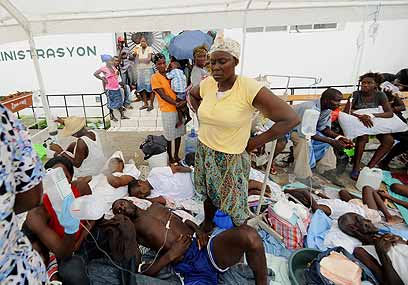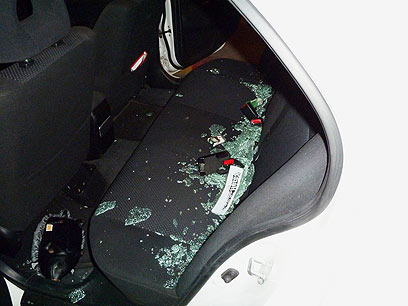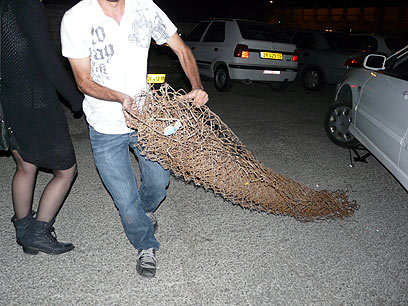Azerbaijan leader applauded at Jewish education center in Baku, says hopes 'school's graduates will be proud Jews and proud Azeri citizens'
Dmitriy Prokofyev Published: 11.07.10, 08:23 / Israel Jewish Scene
A Muslim president of a Muslim country inaugurating a Jewish school is not exactly a common event. And yet, Azerbaijan's President Ilham Aliyev recently visited a Jewish education center in the capital city of Baku, accompanied by his education minister, minister for religious affairs, mayor and other senior officials.
Azeri President Ilham Aliyev. 'Courage and wisdom' Photo: Reuters
Upon his arrival, the president was applauded and cheered by the ceremony's attendees. "I hope the graduates of this school will be proud Jews as well as proud Azerbaijani citizens," he said.
President Shimon Peres sent a televised greeting to his Azeri counterpart in honor of the occasion, expressing his deep appreciation of the unusual gesture in building the large Jewish center in Baku.
"I would like to salute you for your courage and wisdom, in this pragmatic world we live in, to maintain values of building schools and centers for all religions so that not a single book is buried and not a single prayer is lost. I would like to thank you from the bottom of my heart for the traditional way you treat the Jewish people and the State of Israel. Your father and you will always be remembered as great personalities, who have a vision and act courageously and humanely."
Israel was represented by Chief Sephardic Rabbi Shlomo Amar, who was impressed by the national and religious tolerance in Azerbaijan, blessed President Aliyev and the citizens of his country, and installed a mezuzah on the entrance gate.
Another important guest was Israeli businessman Lev Leviev, who donated funds to the center.
Baku is the capital of Azerbaijan, a Shiite country and neighbor to Iran. It is a very rich city, as Azerbaijan is a major exporter of oil to Western Europe, and has about two million residents. Its Jewish community has some 30,000 members.
The school, intended for 450 students, was built in a luxurious neighborhood on a hill facing the sea. The compound, which stretches over 3.5 acres, has three modern buildings housing a school, a kindergarten, a daycare center, sports facilities, a concert hall and a synagogue. The money was invested by Leviev's Or Avner fund.
The education center's inauguration was preceded by a meeting between Aliyev, Rabbi Amar, Leviev, and Chairman of the Federation of Jewish Communities Berel Lazar.
The route leading to the president's residence was blocked to traffic, and police officers standing in every corner saluted the convoy. Rabbi Amar was shocked, noting that "this is the first time traffic in a city is blocked to allow Israel's chief rabbi to get through."
Against anti-Semitism
During the meeting, President Aliyev turned to Leviev as an old friend. The two have known each other for many years thanks to the Jewish businessman's humanitarian gestures.
Aliyev told the rabbis, proudly, that his country's Jews never experienced anti-Semitism and that he himself was unfamiliar with the word "anti-Semite" until he traveled abroad for academic studies.
He showed proficiency in the affairs of his country's Jewish community and invited the chief rabbi to inaugurate a government-funded synagogue slated to be built in Baku in the next two years.
During the meeting, I asked Lev Leviev about the luxurious project and the activity of the Or Avner fund during the financial crisis.
"Crisis or no crisis, the fund continues to operate and donate," he replied, "because this is a real investment in our future as a people. We are gaining more and more Jews. This way we'll be stronger, and I have no doubt you will be blessed by God. We now have more than 500 active communities in the Commonwealth of Independent States alone, and they are developing dynamically."
Why did you choose to build the biggest and most luxurious education center you've ever established in Baku of all places?
"Because of real needs and a coincidence. We have a very intelligent community here, but it's very assimilated, with many mixed families. When the child goes with his father to the mosque on Friday and with his mother to synagogue on Saturday, it turns on a red light. We simply have to give that child the option to receive Jewish education, and for both parents to agree to send him to a Jewish school it has to be a school of the highest quality. At the same time, we received a great response from the political echelon, which even provided the land for free."
What next?
"The education center in Baku is only one chapter. Several weeks ago we opened a school called Or Avner in the southern Ukrainian city of Kherson, now we are opening one in Azerbaijan, and in Hanukkah we will open a similar center in Minsk."














